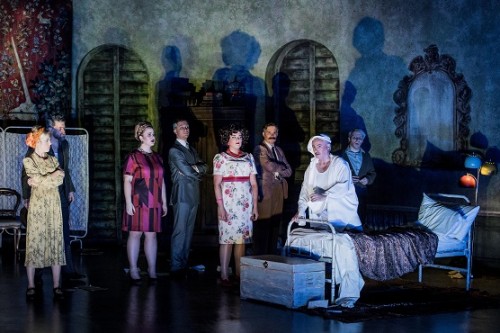 United Kingdom Puccini, Gianni Schicchi: Soloists, Royal Northern College of Music Opera Chorus and Orchestra / Martin André (conductor). RNCM Opera Theatre, Manchester, 7.12.2018. (RJF)
United Kingdom Puccini, Gianni Schicchi: Soloists, Royal Northern College of Music Opera Chorus and Orchestra / Martin André (conductor). RNCM Opera Theatre, Manchester, 7.12.2018. (RJF)

Production:
Director – Robert Chevara
Set and costume designer – Nicolai Hart-Hansen
Chorus master – Kevin Thraves
Cast:
Gianni Schicchi – Quentin Hayes
Lauretta – Yuliya Shkvarko
Zita – Stephanie Maitland
Rinuccio – Iain Henderson
Gherardo – Ryan Davies
Nella – Eliza Boom
Betto – Patrick Relph
Simone – Stephen Fort
Marco – Edward Robinson
Ciesca – Lucy Vallis
Notaio – Liam McNally
Spinelloccio – Peter Brooks
Pinellino – Emyr Jones
Guccio – Matthew Salter
Gherardino – Kristin Frivold
Manchester’s Royal Northern College of Music celebrated the centenary of Puccini’s so-called Il trittico, premiered at New York’s Metropolitan Opera on December 14, 1918, with the duo of two of the trio of works, Suor Angelica (review click here) and Gianni Schicchi. These works had, along with the first of the trio, Il tabarro, engaged the composer on and off since 1913, the year of the premiere of his opera La fanciulla del West, except for a minor excursion into lighter vein with La rondine staged in 1916. Only the uncompleted Turandot, completed by Alfano and premiered in 1925, was to follow from his pen. This trio of operas illustrates to perfection the evolution of Puccini’s musical style from the earlier days of La bohème, 1896, Tosca, 1900 and Madama Butterfly, 1904, to what has come to be termed through composition, where words, emotions and music are intimately combined for dramatic or theatrical effect, unlike earlier styles which aimed to facilitate vocal skills and display for example with the drama coming incidentally.
For students, learning their trade, as they prepare to set out into the competitive world of professional singing, such works are a notable challenge. Students at the RNCM become used to such challenges via the annual stagings put on each year, including some of the most challenging of works in the genre. I have been privileged to see many such productions since the late 1960s and have followed the careers of many former students as they progressed onto the great opera stages of the world. Such professional preparation has taken a further step this year with the adding of seasoned professionals to the mix of casts for the operatic works staged. This gives the students intimate contact with what is involved in professional involvement at very close quarters. In both operas presented, highly experienced professionals have taken leading roles. In this opera the task has fallen to Quentin Hayes, a renowned baritone and also a tutor in the School of Opera Studies at the RNCM.
The story concerns the dying owner of an estate and who leaves his assets to the monks of a nearby monastery rather than his relatives gathered round his deathbed. When the will is found and confirms the worst fears of the relatives, Gianni Schicchi comes up with the idea of impersonating the dead man and dictating a new will. All agree and a notary is sent for. Pretending to be the owner on his deathbed Schicchi dictates a new will, leaving much of the estate to himself, with minor inheritances to the relatives. They are incensed, but powerless when Schicchi reminds them of the trouble they will be in if the plot is discovered. Along the course of events Rinuccio proposes to Lauretta who sings the only true aria in the opera, the famous ‘O mio babbino caro’ (‘Oh my beloved father’), much loved by all lyric sopranos and the public alike and sung after her father agrees to her marriage to Rinuccio, the finder of the original will.
The set and costumes are modern with that for Lauretta particularly appealing and Yuliya Shkvarko sings her aria well if perhaps missing something of its elegiac soul via more graceful phrasing. As Rinuccio, Iain Henderson skips and manipulates well with Patrick Ralph’s Betto particularly spiv-like in egging Schicchi on. The notary, tall and elegant does his small role well, but the key role, that of Schicchi himself is masterly sung and acted by Quentin Hayes, a professional singer with nearly twenty years experience on record and in the theatre. His strong baritone is capable of many colours and his acting is outstanding. A tutor in the college, as well as treading the boards, the students will have learned much from working with him in terms of preparation and delivery.
The singers interact together well indicating excellent preparation from the creative team. The set is wholly appropriate and to finish the evening the orchestral playing and tempi under Martin André is exemplary.
Robert J Farr
